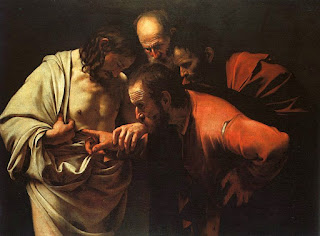 |
| "The Incredulity of St. Thomas" Caravaggio |
"The other disciples therefore said unto him, We have seen the Lord. But he said unto them, Except I shall see in his hands the print of the nails, and put my finger into the print of the nails, and thrust my hand into his side, I will not believe.
And after eight days again his disciples were within, and Thomas with them: [then] came Jesus, the doors being shut, and stood in the midst, and said, Peace [be] unto you.
Then saith he to Thomas, Reach hither thy finger, and behold my hands; and reach hither thy hand, and thrust [it] into my side: and be not faithless, but believing.
And Thomas answered and said unto him, My Lord and my God.
Jesus saith unto him, Thomas, because thou hast seen me, thou hast believed: blessed [are] they that have not seen, and [yet] have believed." John 20:24-29 KJV
"To find the Giver in the gift" is a phrase from "O Beauty Ever Ancient", a hymn taken from a poem by St. Augustine of Hippo. As I heard this during the offertory at Mass at our church the other day, it struck me that God did not make it easy to do that, and that there might well be a reason He did so.
Consider the last sentence of the opening quotation:
"Blessed [are] they that have not seen, and [yet] have believed."So, does God think more highly of those who believe without evidence of His existence? Perhaps not--let's see if a case can be made for doubting Thomases.
WHAT IF GOD MADE SIGNS "MADE BY ME--GOD"?
The Canadian philosopher, John Leslie, has (possibly tongue-in-cheek) put forward the following proposition:
"Suppose that the words MADE BY GOD were found all over the world's granite...Two explanations suggest themselves. Perhaps God put the words there or perhaps very powerful visitors from Alpha Centauri are playing a practical joke. Both explanations might account for the facts very well, yet along comes a philosopher with the hypothesis that the 'only really possible' natural laws are ones which make granite carry those words." John Leslie, Universes, p.16.This example is not to denigrate philosophers per se, but to illustrate the prejudice held by academics and others against supernatural or other worlds explanations.
Why did God make a universe with ambiguous indicators that he did create it, rather than one with signs "MADE BY GOD"? One reason is to make sure free will is operative. In order that we employ our reason, and accede to the grace given us by free will, it is necessary that the case for God's existence not be airtight, even to dolts and sour-minded ones. As it says is the Book of Wisdom:
All men were by nature foolish who were in ignorance of God, and who from the good things seen did not succeed in knowing him who is, and from studying the works did not discern the artisan;...
But yet, for these the blame is less;
For they indeed have gone astray perhaps, though they seek God and wish to find him....
For they search busily among his works, but are distracted by what they see, because the things seen are fair.
But again, not even these are pardonable.
For if they so far succeeded in knowledge that they could speculate about the world, how did they not more quickly find its Lord? Wisdom13: 1-9
TO FIND THE GIVER IN THE GIFTS
We are given the power of reason, so that we can understand the universe around us, how wonderfully and artfully it has been designed, yes designed! We are given free will so that we can understand that the gifts are not to be worshipped, but the Giver. Or, as St. Augustine put it so well:Late have I loved you,We are given the choice of responding to grace given by God; that is the essence of free will. If it were easy, what would be our moral good in the choice? As Jesus said, "even sinners love those who love them". So let us rejoice in the hard choices and triumph over ambiguities.
O Beauty so ancient and so new,
late have I loved you!
You were within me, but I was outside,
and it was there that I searched for you.
In my unloveliness I plunged into the lovely things which you created.
You were with me, but I was not with you.
Created things kept me from you;
yet if they had not been in you they would not have been at all.
You called, you shouted, and you broke through my deafness.
You flashed, you shone, and you dispelled my blindness.
You breathed your fragrance on me;
I drew in breath and now I pant for you.
I have tasted you, now I hunger and thirst for more.
You touched me, and I burned for your peace -St. Augustine, Confessions.
One other important point, added later (1 Dec. 2015): the skeptic, the doubting Thomas makes we who do believe think about the foundations for our belief, and so they help us to justify that belief.

